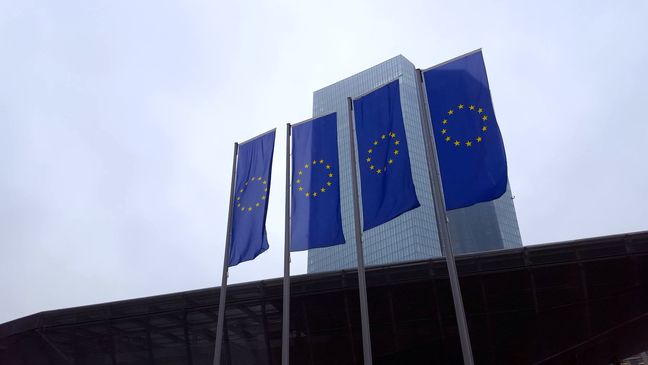Iran-EU Trade Tops €12b (Jan-Aug 2018): Report

EghtesadOnline: Trade between Iran and the 28 member states of the European Union during the first eight months of 2018 amounted to €12.02 billion, indicating a 4.4% decrease compared with last year’s similar period.
EghtesadOnline: Trade between Iran and the 28 member states of the European Union during the first eight months of 2018 amounted to €12.02 billion, indicating a 4.4% decrease compared with last year’s similar period.
Iran’s top five trade partners over the period under review were Italy, France, Spain, Germany and Greece with more than €2.93 billion, €1.98 billion, €1.82 billion, €1.71 billion and €1.04 billion worth of transactions respectively.
Trade with Croatia (€62.84 million), Hungary (€80.35 million) Latvia (€6.27 million), Spain (€1.82 billion) and Austria (€390.35 million) saw the highest increase of 1,673.6%, 213.4%, 157.8%, 63.6% and 28% respectively.
Iran experienced the sharpest decline in trade with Cyprus (65.6%), Bulgaria (59.6%), Portugal (53.2%), the Netherlands (44.9%) and Slovakia (28.9%), Financial Tribune reported.
Iran exported more than €6.93 billion worth of commodities to EU member states during the period, which shows an 11.5% rise year-on-year, according to Eurostat data shared with Financial Tribune.
The main destinations of Iranian exports were Italy with over €1.98 billion, Spain with €1.48 billion, France with €1.45 billion, Greece with €1.02 billion and Germany with €275.91 million.
Iran’s exports to Croatia, Hungary and Luxembourg experienced the highest rise, as exports to the Netherlands, Bulgaria and Latvia saw the sharpest decrease.
The top 10 exported commodities included mineral fuel, mineral oil and products of their distillation, bituminous substances and mineral waxes (€6.09 billion), iron and steel (€223.4 million), edible fruit and nuts, zest of citrus fruit or melons (€165.48 million), plastics and articles thereof (€141.59 million), organic chemicals (€29.33 million), coffee, tea and spices (€26.64 million), fertilizers (€22.18 million) products of animal origin (€21.02 million), carpets and other floor coverings (€19.24 million) and nuclear reactors, boilers, machinery and mechanical appliances and parts (€19.15 million).
Iran's imports from the EU during the eight months decreased by 19.9% YOY to stand at more than €5.08 billion.
The top five European exporters to Iran were Germany with €1.44 billion, Italy with €948.09 million, France with €528.75 million, the Netherlands with €388.35 million and Spain with €346.2 million worth of exports.
Iran’s imports from Latvia, Spain and Sweden saw the highest increase whereas those from Cyprus, Malta and Bulgaria experienced the sharpest decline.
Imported products mainly included nuclear reactors, boilers, machinery and mechanical appliances and parts (€1.68 billion), vehicles other than rail or tramway rolling stock and parts and accessories thereof (€473.17 million), electrical machinery and equipment, sound recorders and reproducers, television image and sound recorders and reproducers and parts (€464.07 million), optical, photographic, cinematographic, measuring, checking, precision, medical or surgical instruments and apparatus (€359.01 million), pharmaceutical products (€358.84 million), iron or steel products (€208.5 million), miscellaneous chemical products (€142.35 million), plastics and plastic articles (€129.36 million), essential oils and resinoids, perfumes, cosmetic or toilet preparations (€98.55 million) and organic chemicals (€82.94 million).
> EU Looks to Protect Iran Trade in Defiance of Trump
The European capitals are scrambling for ways to mitigate the worst effects of new US sanctions on Iran.
US President Donald Trump announced on May 8 his withdrawal from JCPOA and promised to return harshest sanctions in history against Iran.
The first round of renewed sanctions entered into effect on August. The unilateral US sanctions reimposed on August 7 prohibit Iran's purchase of US dollars and precious metals, part of a larger move that attempts to cut the country off from the international financial system.
A second round of US sanctions on Iran's oil and gas sector are set to go into effect on Nov. 4.
The EU plan under review would involve establishing a kind of clearinghouse for all European trade with Iran, according to German business newspaper the Handelsblatt.
A form of commercial entity known as a “special purpose vehicle” would be established, with European governments as shareholders.
The new company would act as an intermediary for cross-border payments to and from Iran, with no involvement from European commercial or central banks, which are wary of becoming the target of American countermeasures.
The clearinghouse is likely to be based in Luxembourg, but its capitalization remains unclear. The European Investment Bank and national development banks, like Germany’s KfW, may be involved, although here too there is concern over American retribution.
European governments have rarely acted so decisively in opposition to American foreign policy. Their action is partly motivated by the fear of instability in the Middle East. But there is also real anger at what is viewed as an American attack on European sovereignty.
Trump’s government is seen as coercing compliance rather than working out a consensually agreeable policy.
A determined effort to get around US sanctions would also encourage European businesses to stay the course in Iran. Although many international companies have pulled out of Iran, a few smaller German firms have significant investments in the country.
If Iran cannot export oil, it will run short of foreign currency to pay for these contracts.
Although India, China and Turkey have pledged to maintain economic relations with Iran, these may inevitably be reduced. European imports of oil from Iran have already fallen, not least because European-based oil tankers are no longer transporting Iranian oil.
source : eghtesadonline